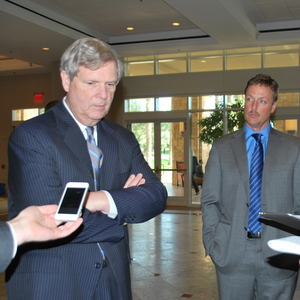Vilsack calls for ethanol industry support of trade negotiations

Susanne Retka Schill
February 27, 2015
BY Susanne Retka Schill
Secretary of Agriculture Tom Vilsack asked for the ethanol industry's support for the Trans-Pacific Partnership in his keynote address at the 2015 Growth Energy Executive Leadership Conference held in Phoenix Feb. 26-27.
The opponents to the TPP are well organized, he explained, while those who understand the benefits have not been vocal. "I spoke to a Congressman that said he had 1,200 comments opposed to TPP and just two in favor," he said. There is a great opportunity to expand exports to Asia, which is expected to see the middle class grow to number 3.2 billion in the next 15 years. "There won't be that opportunity if we don't get the TPP agreement done," he said, "and it will create a huge void. Who's going to fill that void?" he asked. "China. Who would you rather write the rules of trade, China or the U.S.?"
Advertisement
Chief Agricultural Negotiator Darci Vetter, who spoke at the conference before Vilsack, said many parts of the TPP have been negotiated, which leaves the most difficult issues left to decide. The TPP goes beyond expand export opportunities through the elimination of trade barriers and tariffs, to include intellectual property protection and transparency on rulemaking. She said that under the TPP, ethanol tariffs into Japan and Vietnam will be eliminated.
Vetter added that a successful conclusion of the Trans-Pacific Partnership will pave the way for negotiations with the European Union and others in the Transatlantic Trade and Investment Partnership, which are at an earlier stage. "We're pursuing the elimination of all tariffs, including those on ethanol," she said.
Advertisement
In addition the discussion on supporting trade negotiations, Vilsack addressed other measures being taken by the USDA. At last year's conference, he noted, he announced the USDA would be dedicating Market Access Program funds to ethanol export development. "We saw a 35 percent increase in exports last year, and for the first time, we had a biofuel trade effort in China."
The agency is working with the White House to find other avenues and funding to support blending infrastructure, he said, even though Congress has blocked USDA from using REAP funds. In addition, the USDA Economic Research Service is going to do a comprehensive review of recent research and publish a report on the progress being made in the renewable fuels industry. "It's long overdue," he said. The productivity gains in agriculture are not understood, he added, pointing out that in last few decades, "we've had a 200 percent increase in production in farm fields and a 2 percent reduction in acres. U.S. agriculture represents 9 percent of our greenhouse gas emissions," he continued, "while internationally that's 14 percent. If we include forestry, we're net zero."
Related Stories
Neste Corp. on July 24 released second quarter results, reporting record quarterly renewable product sales volumes despite weaker margins. SAF sales were up nearly 80% when compared to the first quarter of 2025.
Valero Energy Corp. on July 24 released second quarter results, reporting a profitable three-month period for its ethanol segment. The renewable diesel segment posted a loss, but the company’s new sustainable aviation fuel (SAF) unit operated well.
The IRS on July 21 published a notice announcing the 2025 calendar-year inflation adjustment factor for the Section 45Z clen fuel production credit. The resulting adjustment boosts maximum the value of the credit by approximately 6%.
The U.S. Senate on July 23 voted 48 to 47 to confirm the appointment of Aaron Szabo to serve as assistant administrator of the U.S. EPA’s Office of Air and Radiation. Biofuel groups are congratulating him on his appointment.
U.S. Secretary of Agriculture Brooke L. Rollins today announced the reorganization of the USDA, refocusing its core operations to better align with its founding mission of supporting American farming, ranching, and forestry.
Upcoming Events










